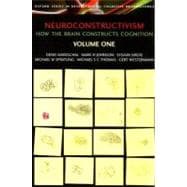
Note: Supplemental materials are not guaranteed with Rental or Used book purchases.
Purchase Benefits
Looking to rent a book? Rent Neuroconstructivism - I How the Brain Constructs Cognition [ISBN: 9780198529910] for the semester, quarter, and short term or search our site for other textbooks by Mareschal, Denis; Johnson, Mark; Sirois, Sylvain; Spratling, Michael; Thomas, Michael; Westermann, Gert. Renting a textbook can save you up to 90% from the cost of buying.
| Preface | p. vii |
| Foundations | |
| Introduction | p. 3 |
| Encellment: the emerging function and morphology of neurons | p. 29 |
| Embrainment: the brain unboxed | p. 49 |
| Embodiment: representations in context | p. 69 |
| Principles, mechanisms and processes | p. 91 |
| Case studies | |
| The cortical basis of early visual perception...a story of multiple representations | p. 107 |
| Habituation in infancy...from interacting neural systems to active exploration | p. 117 |
| Phonological development...the integration of sensory motor representations | p. 129 |
| Infants and objects...from functional brain systems to behaviour | p. 139 |
| Ensocialment...minds and brains in society | p. 149 |
| Lesson from atypical development | p. 159 |
| Dyslexia: a case study of the application of the neuroconstructivist principles | p. 177 |
| Conclusions | |
| Conclusions and challenges for the future | p. 207 |
| References | p. 229 |
| Index | p. 271 |
| Table of Contents provided by Ingram. All Rights Reserved. |
The New copy of this book will include any supplemental materials advertised. Please check the title of the book to determine if it should include any access cards, study guides, lab manuals, CDs, etc.
The Used, Rental and eBook copies of this book are not guaranteed to include any supplemental materials. Typically, only the book itself is included. This is true even if the title states it includes any access cards, study guides, lab manuals, CDs, etc.